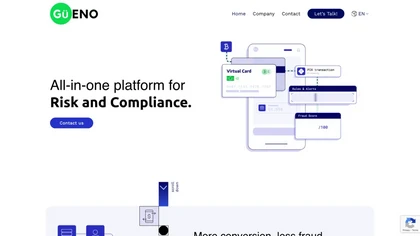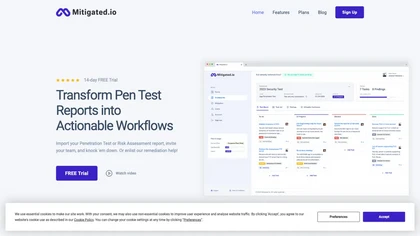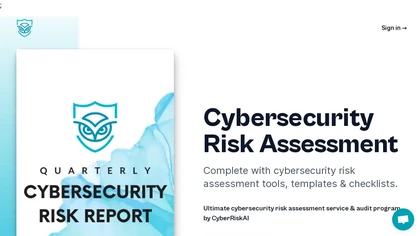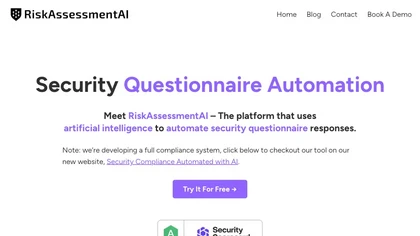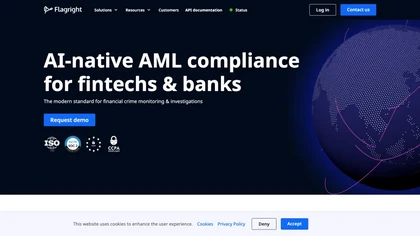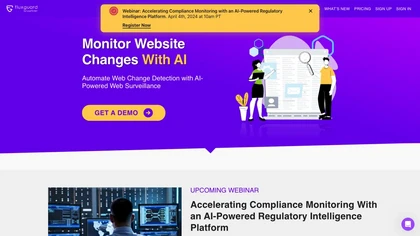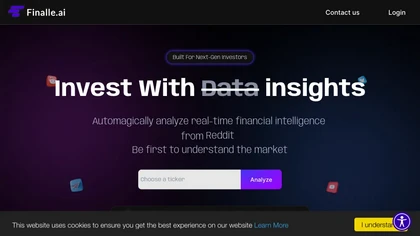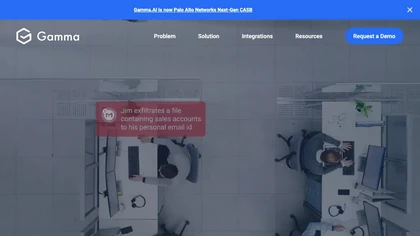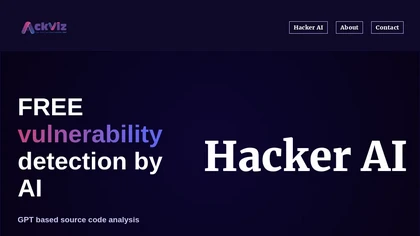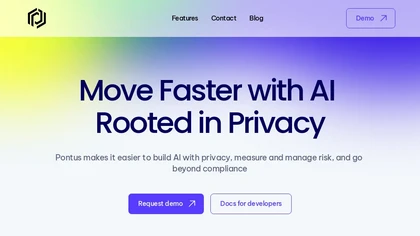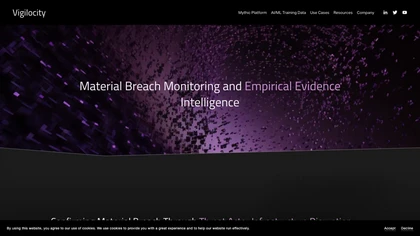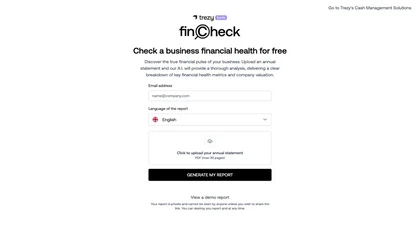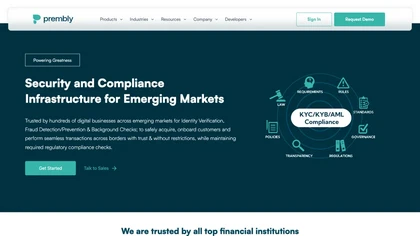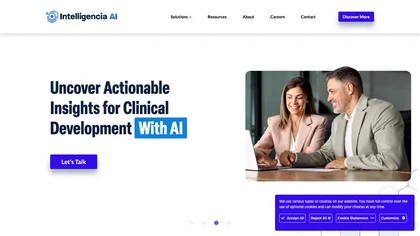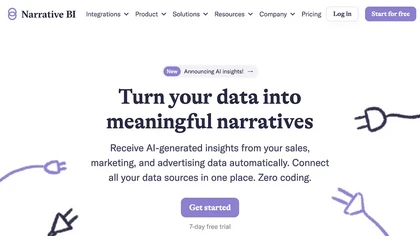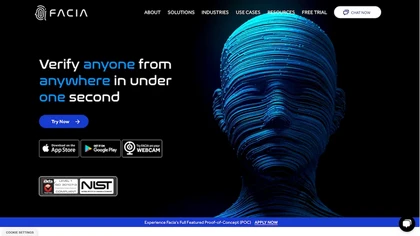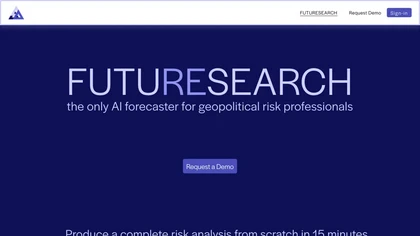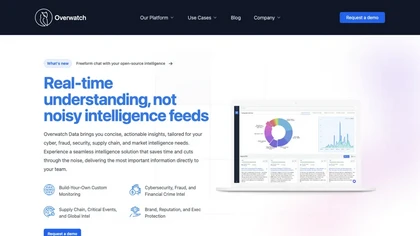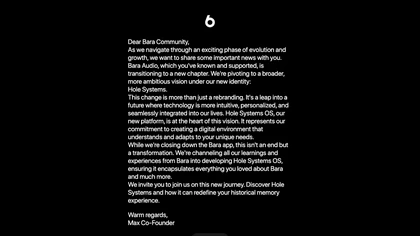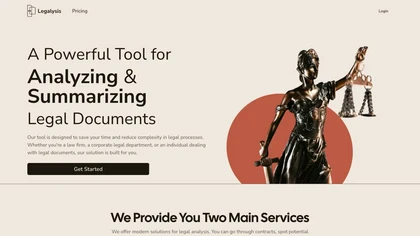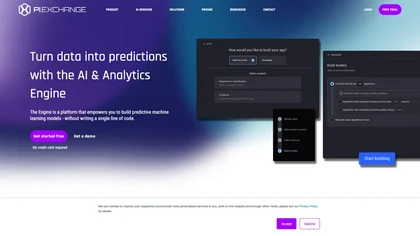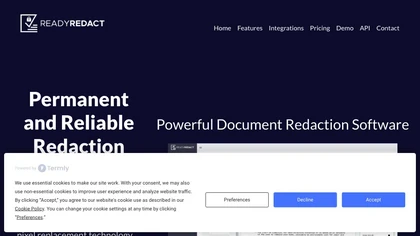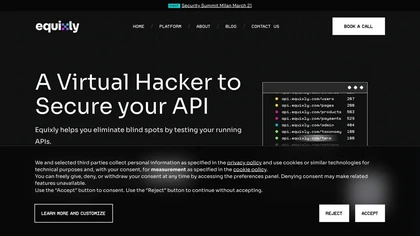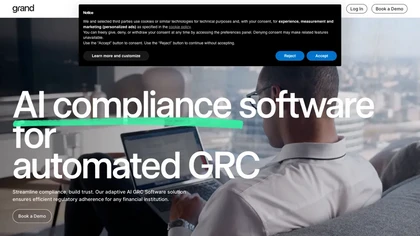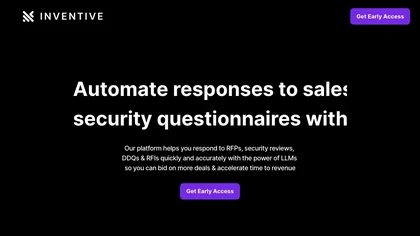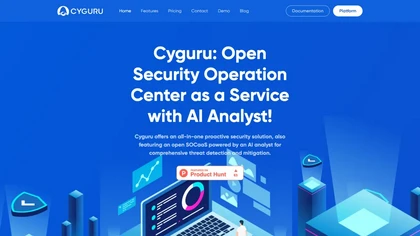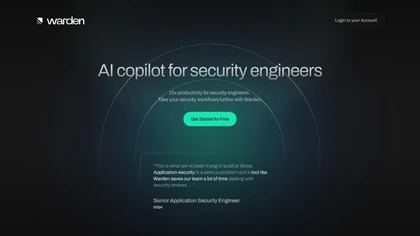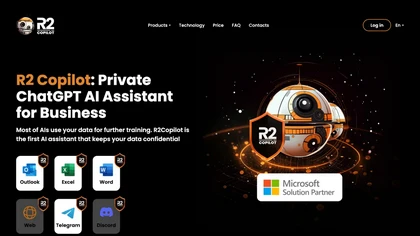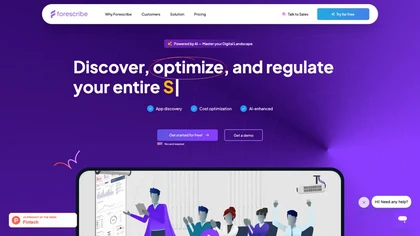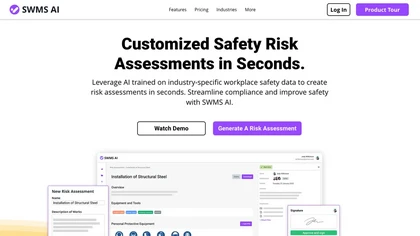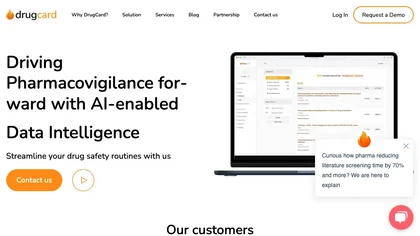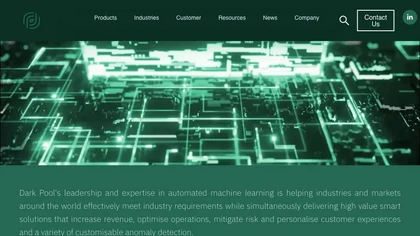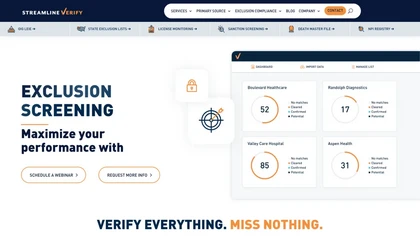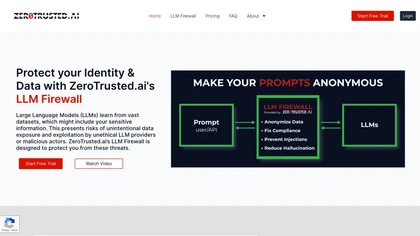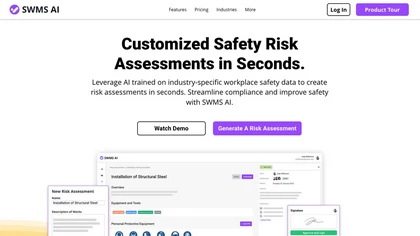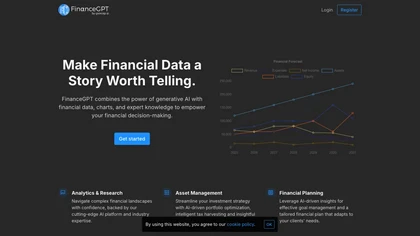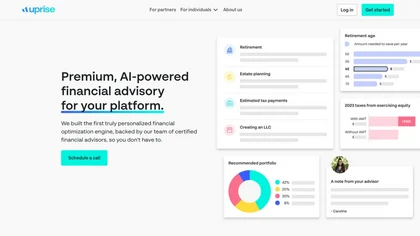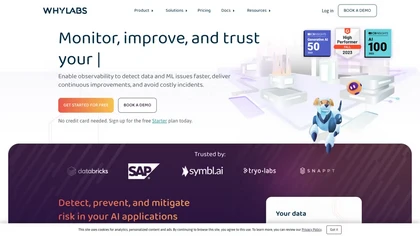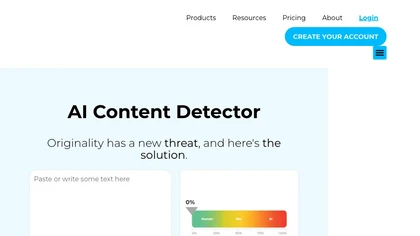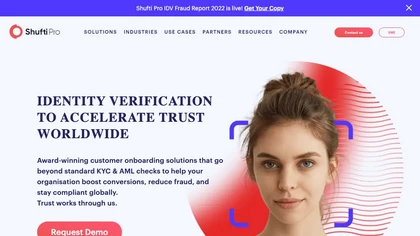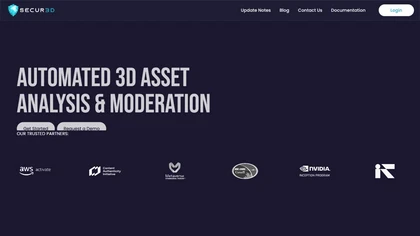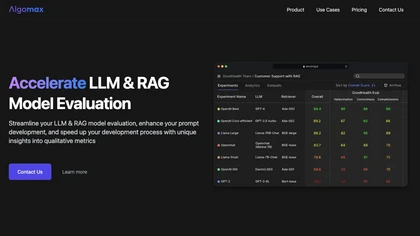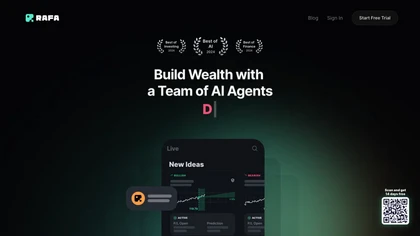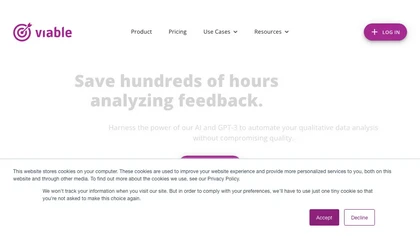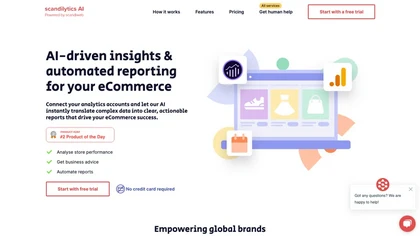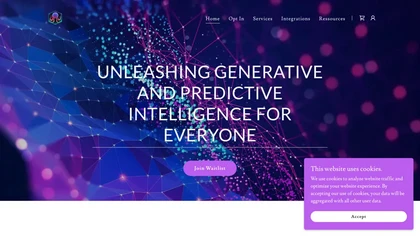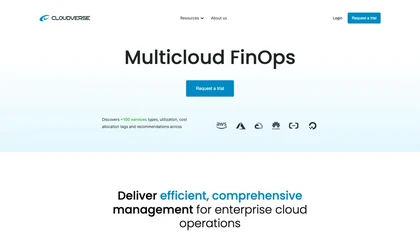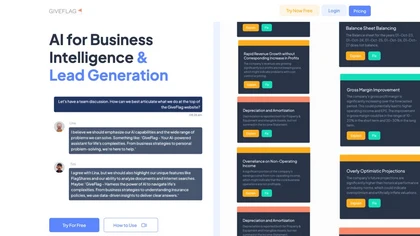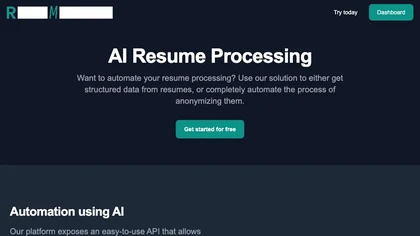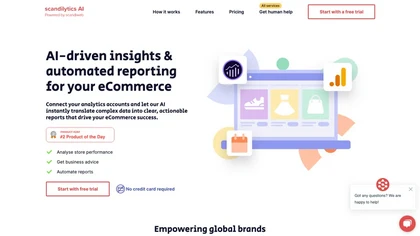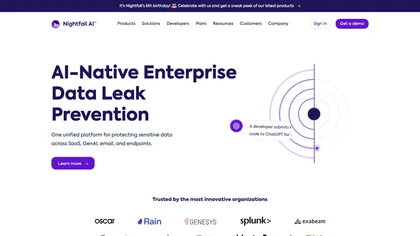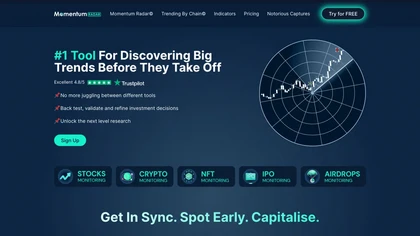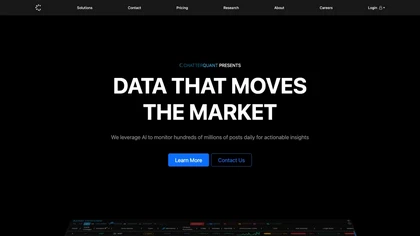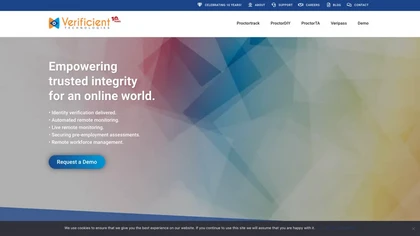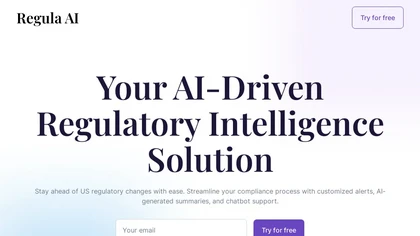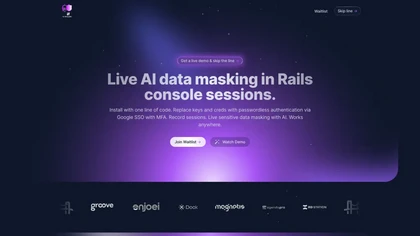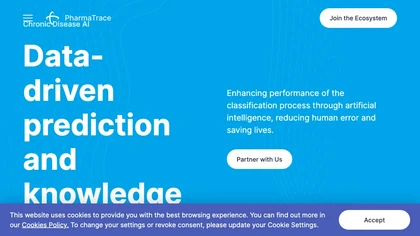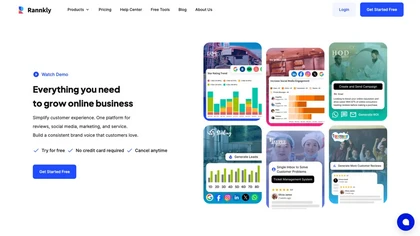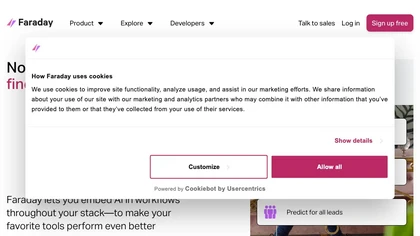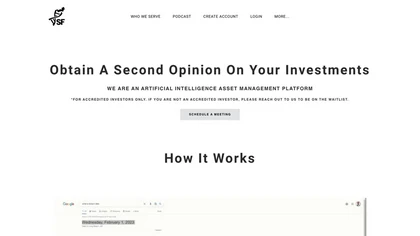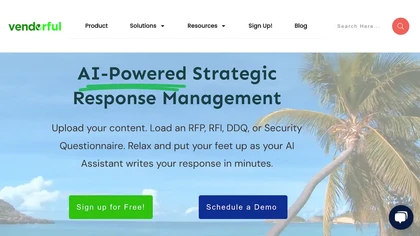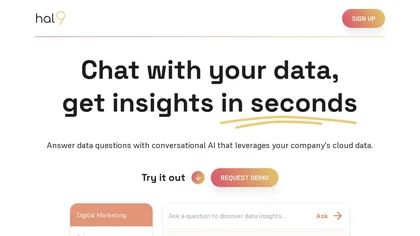AI use cases for Risk Management
Generative AI can be applied in various applications for risk management. Here are some examples to explore below for inspiration with AI tools to get you started with using AI in risk management.
🛠️ 70 AI tools for Risk Management
Explore a dynamic list of some of the most popular tools to get you started with various AI use cases and applications for Risk Management to streamline your workflows and productivity today.
AI-FraudGuard Ecommerce features
- Contactless conversion
- Fraud prevention
- Transaction monitoring
- Compliance processes automation
- Real-time monitoring
Mitigated.io features
- Transforms penetration test risk assessment reports into actionable workflows
- Leverages collaborative workspaces for task assignment and progress tracking
- Provides AI-enriched mitigation guidance for security vulnerabilities
- Supports easy import of assessment reports
- Enables users to enlist security mitigation services directly from the dashboard
Cyberriskai features
- Cybersecurity risk assessment
- Automated quarterly risk audits
- Nist cybersecurity audit framework
- Comprehensive assessment report
- Employee cybersecurity practices
RiskAssessmentAI features
- Automate security questionnaire responses
- Scan documentation
- Build knowledge base
- Support various assessment formats
- Collaboration between teams
Inc. features
- Real-time global threat assessment
- Continuous monitoring and analysis of vast data sources
- Actionable intelligence delivery
- Comprehensive insights into evolving threats
- Integration of advanced data analytics, machine learning, and predictive modeling
Flagright AI features
- Real-time transaction monitoring
- Case management
- Automated end-to-end solutions
- AI forensics for investigating suspicious activities
- Customer risk assessment automation
Fluxguard features
- Web Change Monitoring using generative AI
- Screenshots and pixel change detection
- Text change detection and network analysis
- Real-time or scheduled report dispatch
- Email reports with screenshots and text changes
🔥
Create your account, save tools & get personal recommendations
Receive a weekly digest of our handpicked top tools.
Unsubscribe anytime
Finalle features
- Twitter analysis
- Reddit analysis
- News analysis
- Blog post analysis
- Market insights
Gamma.ai
4.8Gamma.ai features
- Continuously monitors employees
- Notifies of security mistakes
Hacker AI
4.6Hacker AI features
- Source code scanning
- Security weakness identification
- Potential exploitation detection
- Hacker targeting prediction
- Malicious actor analysis
Phishr features
- Interactive training
- Shows users what they missed in the email
- Preview of user experience when getting caught out
- Lifetime access for $1,400
- Training to identify phishing emails
Pontus features
- Privacy-focused ai platform
- Smart anonymization feature
- Intuitive dashboard for auditing compliance
- Trust-made-easy components
- Secure document storage and privacy-aware caching
- Works with common llm providers
- Incorporates toxicity checking
Vigilocity features
- Utilizes bespoke training data
- Tracks, monitors, and disrupts threat actors
- Provides near instant notification of fraudulent domain registrations
- Prioritizes confirmed security breaches based on material impact
- Empowers security, audit, and regulatory teams with valuable insights
FinCheck by Trezy features
- Financial health assessment
- Annual statements analysis
- Multilingual reports
- Privacy control
- Security features
Prembly features
- IdentityPass
- IdentityRadar
- Background Check
- IdentityForm
- 100+ APIs
intelligencia.ai features
- Measuring the likelihood of success in drug development
- Identifying underlying drivers contributing to technical and regulatory risks
- Optimizing clinical trial design
- Standardizing risk evaluation processes
- Transparent and explainable AI features
Narrative BI features
- All the metrics under one roof
- Natural language generation
- Anomaly detection
- Scheduled reports
- AI driven insights
- Slack chatbot
- Multiple data channels integrations
Facia features
- Face recognition
- 3d liveness detection
- Liveness detection technology
- Versatile applications
- Secure data storage
- Robust apis
- Ios and android compatibility
- Existing system integration
- Detailed documentation
- 24/7 support
hCaptcha features
- Comprehensive security platform
- Instant detection and deterrence of human and automated threats
- Easy deployment with universal support
- Advanced security measures against various threats
- Privacy and compliance features to meet global standards
Futuresearch features
- Comprehensive risk assessments in 15 minutes
- Five-stage AI-powered workflow
- Daily analysis of new scenarios
- Search scenarios based on daily news
- Simulate future outcomes with accurate predictions
Overwatch Data features
- Real-time intelligence platform
- Actionable insights tailored to various needs (cybersecurity, fraud, security, market intelligence)
- Custom monitoring capabilities for cybersecurity, financial crime intel, and brand reputation management
- Coverage of social media platforms in over 15 languages, news sources, deep web, and dark web crime-focused telegram channels
- Intuitive data visualizations, category breakdowns, and real-time executive summaries
Bara Platform features
- Advanced artificial intelligence tool
- In-depth analytics and predictive insights
- Cutting-edge algorithms and machine learning capabilities
- Intuitive dashboard for visualizing complex data sets
- Actionable insights for strategic decision-making
Legalysis features
- Contract risk analysis
- Document summarization
- Legal Language Model (LLM)
- Cross-country risk pointing
- Time-saving document summarization
Pi Exchange features
- End-to-end machine-learning tool
- Eliminates the need for coding
- Smart data preparation
- Model development
- Deployment functionalities
ReadyRedact Document Redaction features
- Redacting
- Documents
- Privacy
- Data protection
- Compliance
- Gdpr
- Ccpa
- Lgpd
- Popi
- Hipaa
Equixly features
- Continuous scanning of APIs for security vulnerabilities
- Detection and fixing of security issues in development process
- Scalable API pentesting capabilities
- Mapping of attack surface and inventory of API landscapes
- Transparent compliance reporting model
Grand features
- Automated GRC software
- Efficient regulatory adherence
- Compliance workflows automation
- Policy and regulatory news monitoring
- Insights into regulatory changes
Inventive features
- Streamline rfis, rfqs, security reviews, rfps
- Generate reliable answers with ai
- Reduce reliance on subject matter experts
- Save substantial time and effort
- Up-to-date content
CYBER AI features
- Upload security reports
- Understand security reports
- Unlock data breach reports
- Guide through step-by-step threat hunting process
- Uncover potential cybersecurity threats
Cyguru features
- Cloud-based AI security operation center (SOC)
- AI-powered attack detection
- Continuous monitoring for vulnerabilities and misconfigurations
- Compliance with essential security standards (GDPR, PCI DSS, NIST)
- ML and AI detection capabilities for identifying anomalies and suspicious activities
Warden features
- Streamlining security workflows
- Automated generation of technical architecture diagrams
- Identification of issues and risks within projects
- Automatic generation of risk factors
- Suggestion of possible mitigations for risks
R2 Copilot features
- Data privacy focus
- Secure infrastructure integration
- Task assistance (email replies, data analysis, drafting)
- Beneficial for professionals from various sectors
- Emphasis on data security and privacy compliance
Forescribe features
- Discover, analyze, and manage integrations of SaaS applications
- Provide real-time insights on SaaS usage and compliance
- Automated compliance checks for SaaS applications
- Offer cost optimization suggestions for SaaS applications
- Enhance transparency in digital landscape governance
SWMS features
- AI risk assessments
- Safety Co-Pilot integration
- Customization options
- Quickly generate safe work sequences
- AI-powered safety recommendations
DrugCard features
- Automates drug safety routines
- Multiple languages and countries
- High-performance screening
Dark Pools AI features
- Financial crime detection
- Anomalous behavior detection
- Data mapping
- Machine learning
- Data visualization
Streamline Verify features
- Screening against various databases including OIG LEIE, state exclusion lists, license monitoring, sanction screening, death master file, and NPI registry
- One-stop portal for quick identification and resolution of compliance screening issues
- API integration for future compliance needs
- Enhances efficiency in executing exclusion screening and credential management
- Trusted by over 10,000 establishments
ZeroTrusted.ai features
- Anonymity for privacy protection
- Robust security measures like ZTPolicyServer and ZTDataPrivacy
- Reliable accuracy optimization to prevent data hallucinations
- Integration with LangChain tools
- Access to Azure Marketplace
SWMS AI features
- Tailored risk assessments generation
- Customizable safety policies
- Personalized document generation
- Integration of AI assistant for safety information
- Streamlining compliance processes
FinanceGPT features
- Generative AI technology
- Customizable financial forecasting
- Real-time data aggregation
- Advanced analytics
- Targeted towards investors, financial managers, and accountants
Uprise Embedded features
- AI-powered financial advisory platform
- Personalized financial optimization engine
- Automating regulatory compliance
- Concierge services for comprehensive financial planning
- Flexible integration options and white-label solutions
Ferret features
- Due diligence
- Relationship intelligence
- Risk avoidance
- Opportunity spotting
- Information access
WhyLabs AI Observatory features
- Monitor structured and unstructured data
- Generate privacy-preserving dataset summaries
- Provide guardrails, evaluations, and observability for ML models
- Continuous monitoring of data quality, model drift, and key performance metrics
- Support batch and streaming processing
Crossplag features
- Detects human vs ai-generated text
- Uses machine learning algorithm and natural language processing techniques
- Provides fast, accurate analysis
- Easy to use with instant feedback
- Free to use and does not store analyzed data
Shufti Pro features
- Kyc/aml compliance
- Real-time identity verification
- Customer drop-off prevention
- Global business applicability
Secur3D features
- Automated 3D asset analysis
- Geometry and texture analysis for IP protection
- Detection of art theft and brand infringement
- Content categorization and marketplace description generation
- Support for asset comparison and texture matching
Algomax features
- Smooth integration into pipeline
- Comprehensive insights through intuitive dashboard
- Accurate evaluation engine
- Detailed visualizations and constructive feedback
- Qualitative and quantitative metrics for contextual quality measurement
RAFA features
- Real-time insights
- Portfolio alerts
- Risk analysis
- Options activity monitoring
- Customizable AI agents
Fama One features
- Asset management
- Portfolio optimization
- Real-time market data
- Automated trading strategies
- Risk assessment and management
viable features
- Automated qualitative data analysis
- Customer feedback understanding
- Nlp technology
- Feedback analysis
Scandilytics features
- Advanced analytics for store performance insights
- Business advice based on data analysis
- Automated reporting processes
- Connection with analytics accounts for data translation
- AI-based trend analysis and opportunity identification
Predict Expert AI features
- Crafting unique AI models
- Integrating intelligent applications and APIs
- Tailoring AI models and applications to address specific business needs
- Real-time operational insights
- Monitoring performance in real-time
CloudVerse.ai features
- Optimized billing
- Asset management
- Cost variances analysis
- Anomaly detection
- Savings recommendations
GiveFlag features
- Analyze various documents such as business intelligence reports, form 10-K filings, policy analysis, contracts
- Extract relevant information from sources like academic papers, privacy policies, insurance reviews
- Automate administrative and transactional tasks
- Train GPT-based engines with expert knowledge
- Ensure data security with restricted access to files and chat messages
ResuMetrics features
- Resume Analysis API
- Automation using AI
- Candidate Onboarding Automation
- PII Redaction Automation
- Resume Scoring
Data Analyst AI features
- Data Analyst AI
- Automated reporting
- Tailored marketing strategies
- Streamlined marketing efforts
- Secure data processing
Nightfall AI features
- AI-native data leak prevention platform
- Cutting-edge generative AI detection engine
- Sensitive data protection, encryption, and data exfiltration prevention
- Streamlines compliance management
- Flexible platform for custom applications
Momentum Radar features
- Monitoring social media platforms and influencers
- Predicting market trends and sentiment shifts
- Providing valuable insights and signals for decision-making
- Intuitive indicators for timing and entry point identification
- Focus on momentum indicators and on-chain data analysis
ChatterQuant features
- Enterprise dashboards
- Real-time data access through APIs and embeds
- REST WebSocket APIs (upcoming)
- APIs for interaction and read access
- Track mentions of stocks and crypto tickers on social media platforms
SmartTrust.io features
- Fraud detection using AI
- Intention calculation analytics
- Support for popular blockchains like Ethereum, Polygon, and BSC
- Extensive wallet analytics generation
- Telegram integration for accessing the platform and premium features
Verificient features
- AI-powered tools for online identity verification and monitoring
- Proctortrack for secure remote proctoring
- Biometrics, computer vision, and machine learning capabilities
- Continuous identity verification and remote monitoring
- Live proctoring with AI and automated remote proctoring
Regula.ai features
- Provides customized alerts
- Generates ai-summaries
- Natural language query support
- Simplifies compliance
- Helps smbs stay informed about regulatory changes
Fora Day features
- Insightful solutions within seconds
- Identifying potential business problems in advance
- Timely performance data for informed responses
- Simplifies executive agenda preparation
- Condensing OKR deciphering into concise, actionable points
Rails Guard features
- Live data masking for Rails console sessions
- Shielding Rails console access
- Passwordless authentication via Google SSO and MFA
- Automates employee onboarding and off-boarding
- Real-time sensitive data masking
PharmaTrace features
- Chronic disease management
- Early disease detection
- Economic costs reduction
- Budget forecasting
- Decision support
Rannkly features
- Unified inbox for managing review replies
- Automated review analysis for insights
- Competitor analysis
- Automated responses powered by AI
- Enhancing online reputation and customer experiences
Faraday features
- Predicting customer behavior
- Assessing customer potential
- Providing personalized recommendations
- Identifying at-risk customers
- Optimizing marketing campaigns
SageFusion features
- Trend forecasting
- Statistical models and financial statement analysis
- Risk management through portfolio hedging
- Transparent and liquid funds through Interactive Brokers
- Quick fund withdrawal within 48 hours
Vendorful.ai features
- Vendorful ai-powered response management streamlines responses to rfps, rfis, rfqs, and it security questionnaires with ai assistance.
- It is particularly useful for overworked account executives, rfp teams, and startup founders.
- Currently free while gathering feedback.
- Vendorful assures data security through encryption and organization-level data separation.
Hal9
5Hal9 features
- Data-driven decision making
- Facilitates communication with cloud data
- Integration with existing systems
- Empowers business users to access insights independently
- Real-time data processing and analysis
